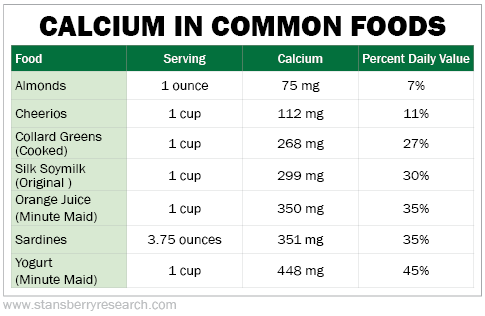I've spent years debunking the one claim Big Pharma keeps pushing: You need more calcium.
Last week, we told you to stop taking those calcium pills or chews. That's because you're already getting much more calcium than you think.
The recommended intake for calcium is about 1,000 mg to 1,200 mg per day.
Many folks (especially women) take multivitamins or calcium chews. Popular brand Viactiv contains 500 mg of calcium in one chew. We've heard of people taking four of these chews a day – that's double the necessary calcium.
In addition, taking this many chews means you're getting way too much vitamin D. Fat-soluble vitamin doses use in international units ("IU") instead of weight (mg). In one calcium chew, you get 500 IU of vitamin D. The daily recommendation is about 600 IU to 800 IU. Take more than one chew and you're well over optimal levels of Vitamin D, too.
What's more, you might be surprised where calcium lurks... Aside from the usual foods like cheeses and whole milk, there are a number of other naturally high-calcium foods and foods with added calcium (think orange juice, soy milk, and cereals).
If you have cereal with soy milk and a glass of orange juice for breakfast, that's already 76% of your daily recommended amount.
Here's a breakdown of some of the more surprising foods that pack on the calcium...

Before you reach for another glass of milk, remember that it's not as safe for your bones as you think.
A study in 2014 found that women who drank three or more glasses of milk per day did not have fewer fractures than those who drank less. Instead, the mortality rate for men and women participating in the survey increased with each daily glass of milk consumed.
Researchers believe the culprit could be galactose, a sugar found in milk that increases inflammation. And inflammation, you remember, plays a role in many diseases, including heart disease, diabetes, and arthritis.
That's why if you do drink milk, be sure to opt for whole milk and limit it to one glass a day. The fat will keep you feeling full, and you'll get plenty of calcium and other nutrients. If you opt for the low-fat or skim varieties, you don't get the calories. That sets you up to overeat to satisfy your hunger hormones.
Personally, I don't even drink milk. Do what I do and get your calcium from a variety of sources, including cheese, yogurt, fortified orange juice, leafy greens, and fish. And don't forget these other tips for keeping your bones strong:
To build better bones, get enough sunshine. Since we need vitamin D to help calcium build bones correctly, make sure to get it from the best source.
Don't leave out magnesium and sodium, either. Help keep your system in balance with foods like fruits, vegetables, nuts, and beans. Three foods high in both elements are fish, avocados, and bananas.
Try weight-bearing exercises and walking. This is one of the best ways to build bone strength. And anyone of any age can do some weight bearing.
Add sea salt to your meals. Regular table salt has iodine, which is important, but sea salt contains some other minerals required for good, strong bone structure – like boron, zinc, and manganese.
We hope you remain skeptical of what Big Pharma tries to push on you. Do your research and remember that these tips will help keep your bones strong without the damaging calcium pills.
What We're Reading...
- Did you miss it? My recent issue on calcium supplements.
- Something different: Got a package you didn't order? It could be a scam.
Here's to our health, wealth, and a great retirement,
Dr. David Eifrig and the Health & Wealth Bulletin Research Team
May 18, 2021
